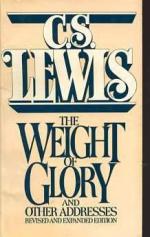
|
| Name: _________________________ | Period: ___________________ |
This quiz consists of 5 multiple choice and 5 short answer questions through Transposition.
Multiple Choice Questions
1. Lewis states, while discussing what scripture promises of heaven, that any idea of Christ we can form now will be what?
(a) Irrelevant.
(b) Correct.
(c) Wrong.
(d) Symbolical.
2. According to "Why I am Not a Pacifist", basic moral intuitions are the only element of ______________ that cannot be argued about.
(a) Precedent.
(b) Logic.
(c) Reason.
(d) Conscience.
3. According to Lewis in his discussion of Pacifism, what sort of society tolerates Pacifists?
(a) Conservative.
(b) Religious.
(c) Liberal.
(d) Anarchist.
4. While talking about his war experience, Lewis refers to which of the following famous works?
(a) The Art of War.
(b) The Iliad.
(c) The Sebastopol Sketches.
(d) Henry V.
5. Lewis states, when discussing intense aesthetic rapture, that if he tries to catch the feeling it produces, what happens?
(a) Nothing ever happens.
(b) He often loses track of the aesthetic experience.
(c) He grasps only a physical sensation.
(d) He gets frustrated.
Short Answer Questions
1. Which of the following analogies does Lewis NOT use when talking about childlike humility?
2. In "Why I am Not a Pacifist" Lewis says that were he to be a Pacifist, he would go against the writings of all but which of the following?
3. In his discussion of right and wrong, Lewis says that any concrete train of reasoning involves all but which of the following elements?
4. Which of the following groups does Lewis NOT mention as fanatical in "Why I am Not a Pacifist"?
5. While talking about his experience in war, Lewis says he found what as he got closer to the front lines?
|
This section contains 286 words (approx. 1 page at 300 words per page) |

|




